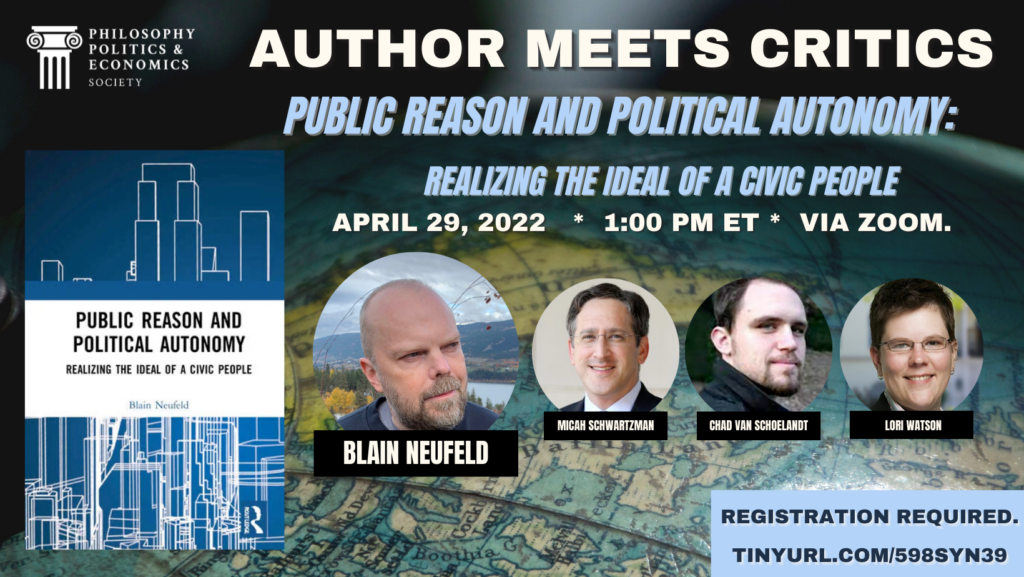
Registration:
Event Abstract:
In this book Blain Neufeld advances a novel justification for the idea of “public reason”: citizens within diverse societies can realize the ideal of shared political autonomy, despite their adherence to different religious and philosophical views, by deciding fundamental political questions with “public reasons.” Public reasons draw upon or are derived from ecumenical political ideas, such as toleration and equal citizenship, and mutually acceptable forms of reasoning, like those of the sciences. This book explains that if citizens share equal political autonomy—and thereby constitute “a civic people”—they will not suffer from alienation or domination and can enjoy relations of civic friendship. Moreover, it contends that the ideal of shared political autonomy cannot be realized by alternative accounts of public justification that eschew any necessary role for public reasons.
In addition to explaining how the ideal of political autonomy justifies the idea of public reason, Neufeld presents a new analysis of the relation between public reason and “ideal theory”: by engaging in “public reasoning” citizens help create a just society that can secure the free compliance of all. The book also explores the distinctive policy and legal implications of the ideal of political autonomy for gender equality, families, children, and education.
This conversation will bring together the following scholars:
Author:
Commentators:
Micah Schwartzman is the Director of the Karsh Center for Law and Democracy and the Hardy Cross Dillard Professor of Law. His scholarship focuses on law and religion, jurisprudence, political philosophy, and constitutional law. He co-edited The Rise of Corporate Religious Liberty and is co-authoring a forthcoming casebook on Constitutional Law and Religion.
Chad Van Schoelandt is Chair of the Department of Philosophy at Tulane University, where he also is Associate Professor. His work is primarily in social and political philosophy, particularly in the public reason and social contract traditions, and at the intersections of philosophy, politics, and economics. He co-edited (with Gary Chartier) The Routledge Handbook of Anarchy and Anarchist Thought.
Lori Watson is Professor of Philosophy at Washington University in St. Louis. Her research focuses on topics in political philosophy, feminism, the philosophy of law, and ethics. She is the author of A Concise Introduction to Logic (with Patrick Hurley), Equal Citizenship and Public Reason: A Feminist Political Liberalism (with Christie Hartley), Debating Pornography (with Andrew Altman), and Debating Sex Work (with Jessica Flanagan). She co-edited (with Brian D. Earp and Clare Chambers) The Routledge Handbook on the Philosophy of Sex.
Moderator:
Christie Hartley is Professor of Philosophy at Georgia State University, where she also is affiliated with the Jean Beer Blumenfeld Center for Ethics and the Institute for Women’s, Gender, and Sexuality Studies. Her research interests are in social and political philosophy, ethics, and feminist philosophy. She is the co-author (with Lori Watson) of Equal Citizenship and Public Reason: A Feminist Political Liberalism.
